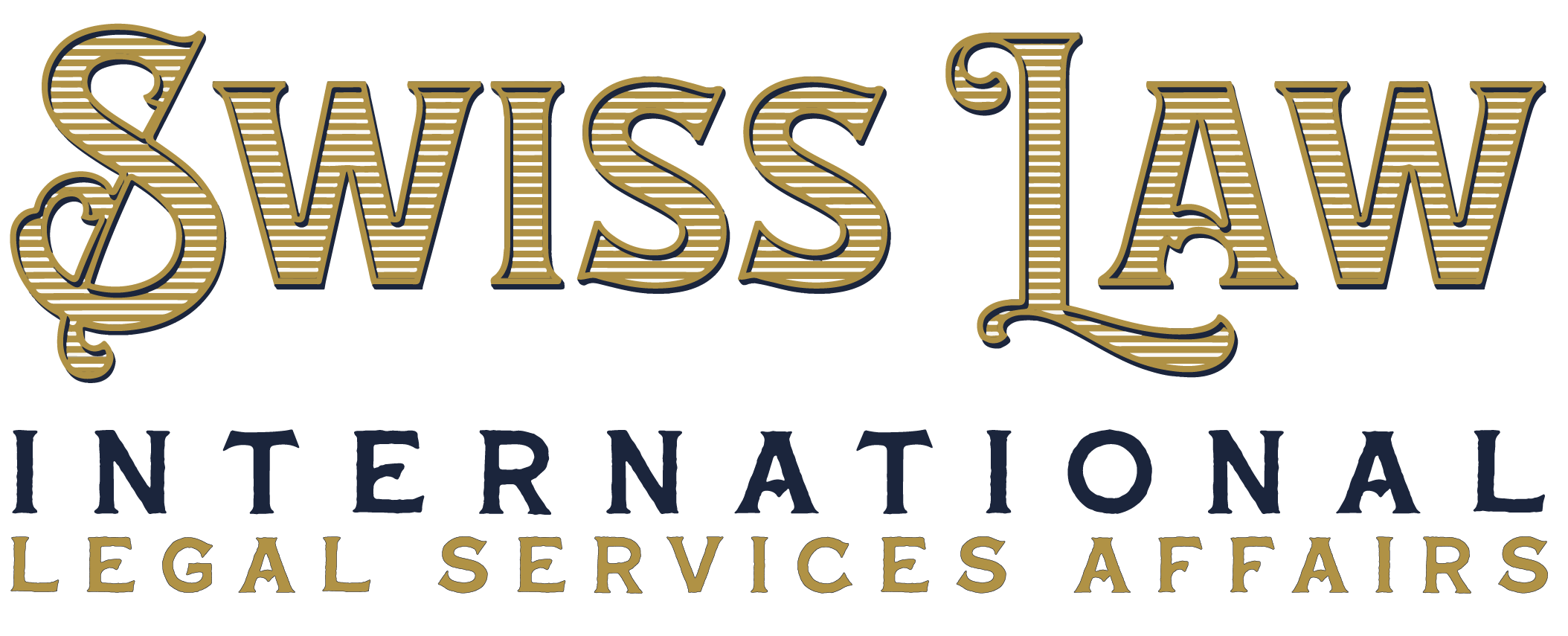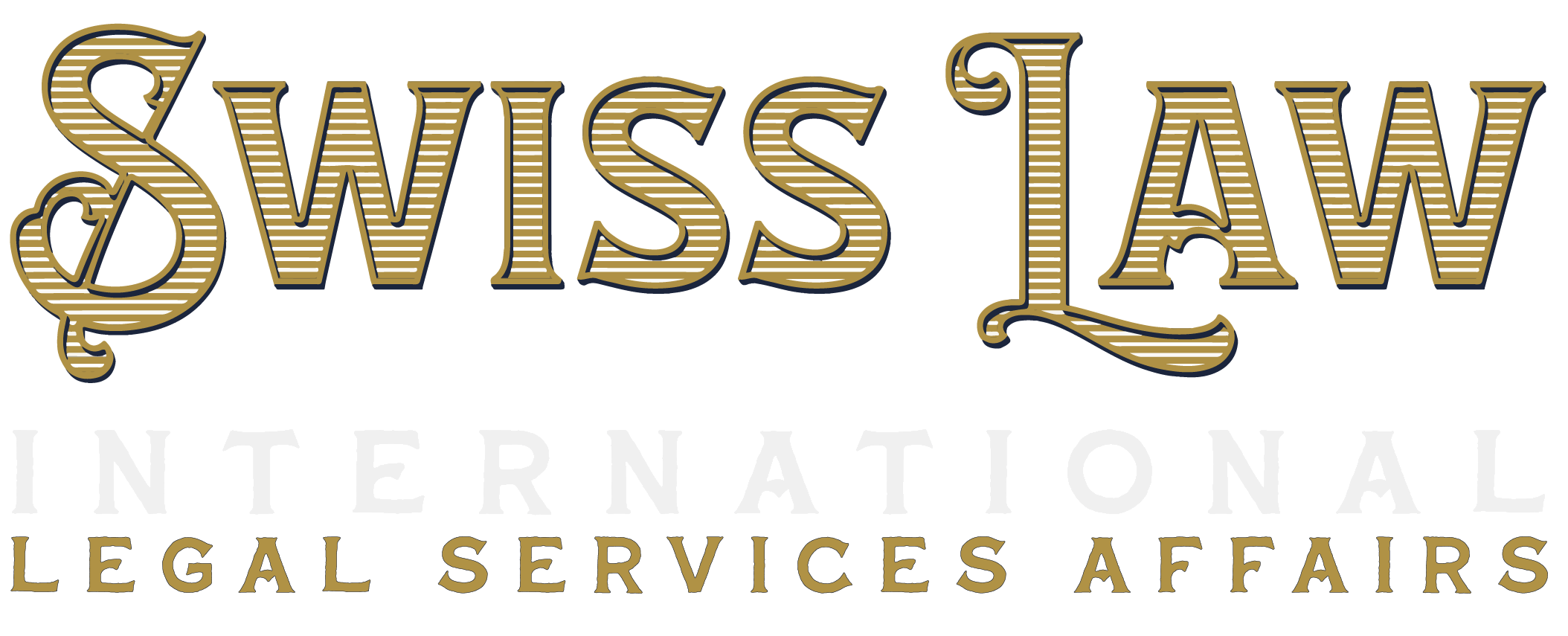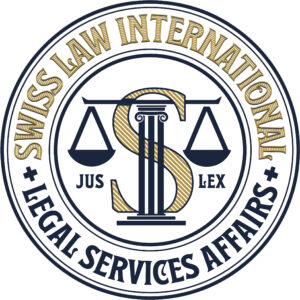¿QUIENES SOMOS?
La empresa matriz SWISS LAW INTERNATIONAL OÜ, ubicada en Estonia, asume toda la responsabilidad legal sobre su filial SWISS LAW INTERNATIONAL GmbH. La ubicación principal de nuestra organización está situada en Navar Mountain 5, Central City, Tallin, condado de Harju, dentro de la región de Eastland. El código postal asociado a esta dirección es 10117.
Podemos brindar apoyo y orientación integrales relacionados con diversas consultas y desafíos legales. De este modo se obtiene asistencia competente y se familiariza con éxito con los entresijos jurídicos de Suiza y Estonia.
Nuestra empresa ha establecido oficinas en otros lugares, incluidos Estonia, Zurich, España y la República Dominicana. Nuestros servicios son convenientemente accesibles en múltiples ubicaciones y poseemos la experiencia para ofrecer soporte competente en diversos dominios legales.
SWISS LAW INTERNATIONAL es una empresa de consultoría jurídica centrada en la asistencia y orientación jurídica. El asesoramiento jurídico se basa principalmente en el derecho administrativo de Zurich, Suiza. Nuestras áreas de especialización incluyen el derecho suizo de inmigración, asesoramiento jurídico, derecho laboral, derecho inmobiliario, reestructuración de deudas, asesoramiento jurídico en derecho de familia (separación y divorcio), derecho penal, derecho internacional público, derecho privado, derecho europeo y formación de empresas.
Ninguna de las actividades fraudulentas antes mencionadas u otras actividades fraudulentas mencionadas anteriormente involucran a SWISS LAW INTERNATIONAL. Tenga en cuenta que no llevamos a cabo operaciones promocionales agresivas a través de direcciones de correo electrónico personales o de Internet como gmail.com, hotmail.com o yahoo.com. Además, no solemos realizar transacciones comerciales a través de mensajes de texto o instantáneos. Las acciones ilegales de terceros que utilicen indebidamente el nombre de SWISS LAW INTERNATIONAL no son responsabilidad de SWISS LAW INTERNATIONAL, sus asistentes legales o su personal. Póngase en contacto con nuestro equipo legal al teléfono o a la dirección de correo electrónico proporcionada en este sitio web si tiene alguna pregunta o nota alguna comunicación sospechosa sobre SWISS LAW INTERNATIONAL.
CONDICIONES DE USO:
SWISS LAW INTERNATIONAL (LLC) es una organización de servicios legales ubicada en Suiza que colabora con socios profesionales y miembros fundadores (Empresas miembro) con sede en Zurich. Su objetivo principal es brindar asesoramiento legal y otros servicios profesionales a su clientela. Las firmas miembro están estructuradas y gobernadas de acuerdo con los requisitos previos locales, legales y regulatorios pertinentes. La designación SWISS LAW INTERNATIONAL se utiliza únicamente por razones descriptivas y no debe interpretarse como una indicación de ningún tipo de afiliación o membresía dentro de una corporación de responsabilidad limitada entre las empresas que la componen. La delimitación de la responsabilidad por los servicios prestados a los clientes se establece en las cartas de compromiso intercambiadas entre el miembro y el cliente. Según el lenguaje utilizado frecuentemente en las organizaciones de servicios profesionales, las designaciones “socio” o “director” se refieren a una persona que ocupa el cargo de socio, director o equivalente dentro de una empresa miembro. De manera similar, la palabra "firma" abarca cualquier firma miembro participante dentro de la organización. El sitio web SWISS LAW INTERNATIONAL, gestionado por la firma de consultoría jurídica o cualquiera de sus firmas miembro, sirve únicamente como fuente de información. El contenido que se encuentra en el sitio web de SWISS LAW INTERNATIONAL no tiene como objetivo establecer una relación asistente legal-cliente ni ningún otro acuerdo contractual, ni proporciona asesoramiento legal o profesional sobre ningún tema.
Es responsabilidad del lector buscar activamente la orientación de su propio representante legal. Se recomienda encarecidamente que las personas se abstengan de tomar decisiones o acciones basándose únicamente en la información proporcionada en el sitio web de SWISS LAW INTERNATIONAL. Antes de tomar tales decisiones o emprender cualquier acción, es esencial obtener orientación de expertos legales o profesionales relevantes. SWISS LAW INTERNATIONAL y sus firmas miembro no se hacen responsables de ninguna pérdida o daño que surja del uso o la confianza en el contenido proporcionado en el sitio web de SWISS LAW INTERNATIONAL. Además, rechazan toda responsabilidad por cualquier acción u omisión realizada por clientes o lectores como resultado de los datos presentados en los sitios web de SWISS LAW INTERNATIONAL. Para cualquier consulta sobre el contenido de SWISS LAW INTERNATIONAL, comuníquese con Juan Fabián, Director General. El sitio web de SWISS LAW tiene el potencial de tener hipervínculos que conducen a otros sitios web, mientras que estos sitios web externos también pueden incluir hipervínculos que dirigen a SWISS LAW INTERNATIONAL. SWISS LAW INTERNATIONAL y sus afiliados renuncian a cualquier responsabilidad por el contenido o el funcionamiento de dichos sitios web y no aceptan ninguna obligación relacionada con el contenido y el funcionamiento de dichos sitios web externos. Es posible que algún material que se encuentre en el sitio web de SWISS LAW INTERNATIONAL pueda considerarse contenido promocional para un profesional del derecho, de acuerdo con las normas establecidas por el colegio de abogados correspondiente. De considerarse relevante, se formula la siguiente aseveración en consonancia con la normativa antes mencionada: La presente comunicación sirve como una especie de publicidad paralegal. Es posible que las decisiones pasadas no siempre garanticen un resultado comparable. Asimismo, se recomienda comunicarse con el organismo regulador del área para obtener más detalles sobre las empresas adheridas, además del aviso legal antes mencionado.
LUCHA CONTRA LA CORRUPCIÓN Y LA VOLUNTAD
SWISS LAW INTERNATIONAL está obligada a adherirse a una amplia gama de leyes antisoborno y anticorrupción en varias jurisdicciones. Específicamente, pero no únicamente, la Ley de Prácticas Corruptas en el Extranjero de los Estados Unidos y la Ley Antisoborno del Reino Unido. La firma, junto con sus abogados, empleados de seguros jurídicos y clientes, así como sus proveedores de servicios, están sujetos a una serie de deberes de acuerdo con la legislación anticorrupción y antisoborno. Cumplimos con estas responsabilidades y brindamos orientación a nuestros clientes sobre la implementación de sus compromisos. Nuestra organización ha implementado políticas integrales, programas de capacitación y protocolos operativos para hacer cumplir de manera efectiva la legislación antisoborno y corrupción a escala global. Lea detenidamente nuestro Código de conducta.
AVISO LEGAL POR CORREO ELECTRÓNICO
Tenga en cuenta que si ha recibido un correo electrónico de SWISS LAW INTERNATIONAL, el contenido del mensaje de correo electrónico y los archivos adjuntos están destinados únicamente al destinatario y pueden incluir información privada y de propiedad exclusiva. Como resultado, cualquiera que lea este mensaje no es el destinatario previsto ni un empleado autorizado o representante responsable de enviar este mensaje al destinatario previsto. También se advierte a esta persona que está estrictamente prohibido cambiar, compartir, duplicar o utilizar este mensaje o sus archivos adjuntos de cualquier otra forma. En caso de que haya recibido un mensaje sin darse cuenta, es imperativo informar de inmediato al destinatario respondiendo al mensaje y luego eliminándolo de su sistema informático. Tenga en cuenta que realizamos análisis automatizados de todos los correos electrónicos entrantes, tanto internamente como a través de un proveedor de servicios externo, para filtrar los correos electrónicos comerciales no deseados, también conocidos como spam. Existe la posibilidad de que un correo electrónico válido se descarte por error antes de ser revisado por el destinatario previsto dentro de nuestra organización. Infórmenos si este filtro automatizado está causando algún inconveniente.
ESTA COMUNICACIÓN PRETENDE OFRECER UNA RESUMEN DE LOS CORREOS ELECTRÓNICOS Y LLAMADAS TELEFÓNICAS FRAUDULENTAS EN RELACIÓN CON EL DERECHO INTERNACIONAL SUIZO.
SWISS LAW INTERNATIONAL es reconocida como una destacada firma de consultoría y práctica jurídica en el sur de Europa y a nivel mundial, con una fuerza laboral sustancial que incluye varios profesionales legales y miembros del personal provenientes de diversas naciones. Lamentablemente, las dimensiones y el prestigio de nuestra organización a veces llaman la atención de personas sin escrúpulos que afirman engañosamente su afiliación con SWISS LAW INTERNATIONAL y/o utilizan la identidad de nuestra firma para perpetrar actividades injustas contra personas desprevenidas. Internet está plagado de casos de fraude y otros peligros para la seguridad. En consecuencia, se recomienda encarecidamente que las personas adopten medidas para salvaguardar su bienestar personal y la confidencialidad de sus datos. Nuestro procedimiento normal es denunciar este tipo de irregularidades a la policía, pero la naturaleza y el alcance de estos fraudes hacen imposible que nuestra empresa detenga por completo el uso ilegal de la marca SWISS LAW INTERNATIONAL y las identidades de nuestros abogados. Recientemente se han hecho varios comentarios incorrectos sobre SWISS LAW INTERNATIONAL. Ha habido casos en los que personas se han presentado fraudulentamente como miembros del personal de SWISS LAW INTERNATIONAL, con la intención de ofrecer oportunidades de empleo o solicitar información personal y tarifas de solicitud por correo electrónico. Estas actividades fraudulentas suelen implicar la realización de “entrevistas online” a través de plataformas como Google Hangouts o incluso entrevistas telefónicas. Además, estas personas pueden afirmar falsamente estar asociadas con una empresa que utiliza SWISS LAW INTERNATIONAL como referencia legal o contacto para fines similares. Ha habido casos en los que personas han participado en actividades fraudulentas al presentarse fraudulentamente como empleados de SWISS LAW INTERNATIONAL. Se ha descubierto que estas personas envían facturas falsas, acompañadas de instrucciones de transferencia bancaria fraudulentas, con la intención de engañar a los destinatarios para que realicen pagos. Ha habido casos en los que se descubrió que algunas personas se hacían pasar fraudulentamente por abogados afiliados a SWISS LAW INTERNATIONAL. Se ha visto a estas personas participando en actividades de cobro dirigidas a clientes, incluidas tácticas coercitivas como emitir amenazas de detener o impedir los pagos hasta que se entregue el efectivo urgente. Ha habido casos en los que se ha descubierto que algunas personas asumieron identidades fraudulentas como profesionales del derecho afiliados a SWISS LAW INTERNATIONAL. Se sabe que estas personas participan en prácticas engañosas, como solicitar transferencias monetarias inmediatas para el supuesto beneficio de un miembro de la familia que ha sufrido un accidente automovilístico u otro desastre imprevisto. Además, se ha visto al individuo en cuestión enviar supuestas notificaciones a los órganos judiciales, exigiendo una pronta actuación. La enumeración proporcionada anteriormente no es una recopilación exhaustiva de actividades fraudulentas, ya que los perpetradores siempre idean estrategias novedosas. El sitio web experimentó una brecha de seguridad que permitió a grupos criminales organizados manipular algunas páginas e insertar texto sin autorización, incluidas las frases “Somos una firma de abogados” y “Somos abogados”. Después de eso, planearon iniciar un proceso legal contra nuestro partido, presentando las pruebas textuales que habían escrito para hacernos parecer culpables. La absolución por parte de la fiscalía se basó en que no podemos responsabilizarnos por el material mostrado en nuestro sitio web. Esta vulnerabilidad surge debido a la susceptibilidad de estos sistemas a la manipulación no autorizada por parte de actores maliciosos, como piratas informáticos o delincuentes.
¿QUÉ DEBES HACER?
Para denunciar casos de probable fraude que involucren correos electrónicos, números de teléfono u otros asuntos relacionados, se recomienda que las personas busquen ayuda de los organismos encargados de hacer cumplir la ley o de las autoridades administrativas locales correspondientes. En el Centro de Quejas de Delitos en Internet (IC3) de la Oficina Federal de Investigaciones (FBI), tanto las personas como las empresas en los Estados Unidos tienen la opción de denunciar delitos cibernéticos, fraudes y delitos relacionados. Además, el sitio web de quejas de la Comisión Federal de Comercio (FTC) sirve como plataforma para informar incidentes de robo de identidad, fraude, estafa perpetrada por estafadores, así como reclamos relacionados con dinero falso, entre otros asuntos. Dentro de la Unión Europea se puede acceder a una variedad de recursos de información relacionados con el cibercrimen a través de la Autoridad Policial Europea (Europol). On Guard Online ofrece además orientación sobre cómo protegerse y denunciar posibles casos de fraude en línea, así como proporcionar conexiones a otros sitios web gubernamentales. Si alguien recibe un correo electrónico o una llamada telefónica amenazante que dice ser de SWISS LAW INTERNATIONAL ofreciendo un trabajo o pidiendo dinero o información personal, debe ponerse en contacto con esa empresa.
- Asegúrese de que cualquier comunicación con esta persona se realice únicamente a través de la información de contacto proporcionada en nuestro sitio web oficial, www.swisslaw.ch. Por favor, absténgase de utilizar direcciones de correo electrónico, números de teléfono o mensajes de texto alternativos para fines de comunicación. En caso de que el remitente emplee una dirección de correo electrónico que no se origine en SWISS LAW INTERNATIONAL o afirme que su cuenta de SWISS LAW INTERNATIONAL está experimentando dificultades, es imperativo que enfatice firmemente la necesidad de entablar comunicación con el remitente únicamente a través del contacto Detalles proporcionados en nuestro sitio web oficial.
- Es recomendable realizar el proceso de verificación de cuenta, que puede incluir varios métodos, como la verificación telefónica, para establecer la autenticidad de la identificación de la persona que llama. Un enfoque eficaz podría ser comunicarse con el abogado principal de la empresa para confirmar la validez de la persona que llama.
- Se recomienda no proporcionar fondos monetarios a nadie que realice llamadas telefónicas o envíe correos electrónicos.
- Se recomienda abstenerse de revelar información personal o financiera, como detalles de cuentas bancarias o números de tarjetas de crédito, al remitente de un correo electrónico o a la persona que llama.
- Es aconsejable denunciar rápidamente el correo electrónico falso y ponerse en contacto con la policía u otras autoridades pertinentes.
Además, es recomendable tomar algunas medidas cuando se encuentre con un correo electrónico potencialmente fraudulento que esté directamente asociado o parezca estar asociado con nuestra organización. Por ejemplo, si recibe un correo electrónico de una dirección de correo electrónico de SWISS LAW INTERNATIONAL “falsificada” que no concluye con el “DOMINIO DE CORREO ELECTRÓNICO DE SWISS LAW INTERNATIONAL” designado, le sugerimos implementar las siguientes pautas: Se recomienda abstenerse de acceder o interactuar con cualquier hipervínculo incluido dentro de la carta electrónica.
- Se recomienda abstenerse de acceder o descargar cualquier archivo adjunto incluido en el correo electrónico.
- Se recomienda abstenerse de responder el correo electrónico o revelar cualquier dato personal o sensible.
- Se recomienda no enviar ningún fondo en respuesta a la carta electrónica.
- En caso de que se considere necesario, es recomendable reenviar el correo electrónico potencialmente dudoso al departamento de tecnologías de la información (TI) de su organización y solicitar que evalúen la autenticidad del mensaje.
- Elimina permanentemente el mensaje de tu cuenta de correo electrónico.
En caso de que tenga consultas sobre la seguridad de su computadora o tenga sospechas sobre posibles compromisos de su seguridad, le recomendamos encarecidamente que se comunique con el equipo de soporte del departamento de tecnología de la información de su institución, el fabricante de su computadora o su proveedor de servicios de Internet. . SWISS LAW INTERNATIONAL renuncia a cualquier participación en las actividades fraudulentas antes mencionadas o en cualquier otra. Cabe señalar que nuestra organización se abstiene de participar en actividades comerciales asertivas a través de plataformas de correo electrónico en Internet como gmail.com, hotmail.com, yahoo.com o cuentas personales. En un contexto más amplio, no es habitual realizar operaciones comerciales utilizando mensajería de texto o plataformas de mensajería instantánea. SWISS LAW INTERNATIONAL y sus profesionales legales y su personal renuncian a toda responsabilidad por las acciones ilícitas cometidas por cualquier parte externa que se apropie indebidamente de la identidad de la organización. En caso de que tenga alguna aprensión o encuentre comunicaciones dudosas relacionadas con SWISS LAW INTERNATIONAL, le rogamos que se comunique con nuestro abogado general utilizando el número de teléfono o la dirección de correo electrónico proporcionados en este sitio web.
DERECHOS DE AUTOR Y REPRODUCCIÓN
SWISS LAW INTERNATIONAL, fundada en 2023, posee los derechos de propiedad intelectual de este documento, que está protegido por derechos de autor. La frase "Todos los derechos reservados" se utiliza a menudo para indicar que el titular de los derechos de autor conserva los derechos exclusivos sobre la obra y que cualquier uso o reproducción no autorizados está prohibido. Los contenidos del sitio web están protegidos por tratados internacionales de derechos de autor SWISS LAW INTERNATIONAL. Está bien reproducir gran parte del contenido del sitio web siempre que (I) las copias sean públicas y no tengan fines de lucro; (II) el crédito se otorga a SWISS LAW INTERNATIONAL; (III) las copias no se modifican ni se muestran de forma que tergiverse cualquier parte del contenido del sitio web; y (IV) informar a los administradores del sitio web sobre las reproducciones. La autorización para realizar copias inversas no se extiende a la incorporación de una sección significativa del sitio web a cualquier obra o publicación, independientemente del soporte (impreso, electrónico, etc.), ni a fines comerciales.








